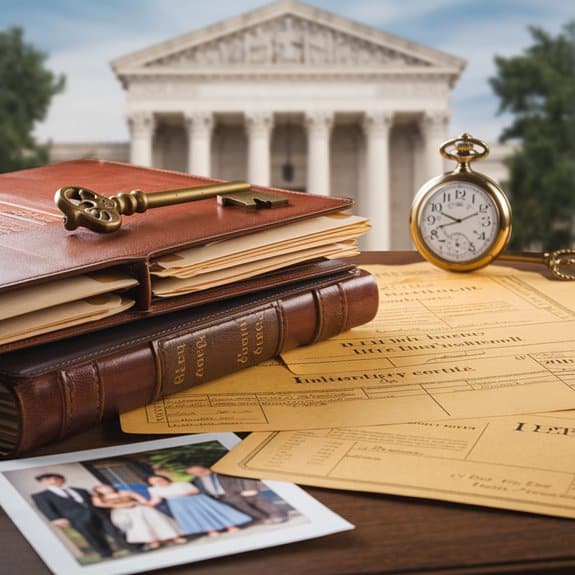
In BC, you can reclaim estate assets through wills variation claims if you are a spouse or child who was not adequately provided for. You will need to prove undue influence, resulting trust, or challenge joint ownership transfers. Gather medical records, witness testimony, and financial documents to strengthen your case. Consider timing, costs, and relationship dynamics before proceeding. Legal representation is essential due to complex limitation periods and evidentiary requirements. The following sections explore these recovery options in greater detail.
Understanding Wills Variation Claims in British Columbia
While spouses and children in British Columbia may assume they will automatically inherit when a loved one passes away, the reality is not always so straightforward.
Under BC law, spouses and children (including independent adult children) can challenge a will if they believe it does not make adequate provision for them.
BC law permits spouses and children—even independent adult ones—to contest wills they feel do not adequately provide for them.
It is important to understand that wills variation claims only apply to assets that form part of the deceased’s estate.
Any assets that pass outside the estate—such as jointly owned property with right of survivorship, direct beneficiary designations, or gifts made during the will-maker’s lifetime—cannot be claimed through this process.
This limitation creates a strategy some will-makers use: deliberately depleting their estate to minimize potential claims from estranged family members.
The Presumption of Resulting Trust for Inter Vivos Transfers
When a parent transfers property or assets to an adult child without receiving anything in return, the law does not automatically assume it was intended as a gift.
Instead, BC courts apply the “presumption of resulting trust,” meaning the receiving child is presumed to hold those assets in trust for the parent’s estate unless proven otherwise.
This legal presumption places the burden of proof on the child who received the assets to demonstrate that their parent genuinely intended to make a gift.
You will need clear evidence of the transferor’s intention, which might include written documentation, witness statements, or consistent behaviour patterns following the transfer.
The court will examine all relevant circumstances to determine whether the transfer was meant as an outright gift or should be returned to the estate for distribution.
Proving Undue Influence in Estate Asset Transfers
Challenging an asset transfer on grounds of undue influence requires you to demonstrate that the transferor’s free will was overwhelmed by another person’s manipulation or control. You will need substantial evidence to overcome the presumption of validity that courts typically give to completed transfers.
| Evidence Type | What to Establish |
|---|---|
| Medical records | Transferor’s vulnerability or diminished capacity |
| Witness testimony | Controlling behavior by the beneficiary |
| Financial records | Unusual transaction patterns or timing |
| Expert opinions | Professional assessment of mental state |
| Communication records | Isolation or restricted access to the transferor |
Unlike in Franco v. Franco Estate where no undue influence was found, you must prove the transferor could not exercise independent judgment. Courts look for a pattern of control, isolation, dependency, and psychological manipulation rather than mere persuasion or advice.
Joint Ownership and Survivorship Rights Challenges
Joint ownership arrangements with rights of survivorship represent one of the most common methods used to transfer assets outside a British Columbia estate.
When you are challenging these transfers, you will need to overcome the legal principle that joint assets automatically pass to the surviving owner upon death.
To successfully return these assets to the estate, you must prove either a resulting trust exists or that the transfer was not valid.
Courts typically apply a presumption of resulting trust when parents transfer property to adult children, requiring the child to demonstrate the parent genuinely intended to gift the property.
Evidence such as the deceased’s contemporaneous statements, legal transfer documents, and independent witness testimony can be vital in determining whether the joint arrangement was legitimate or merely administrative convenience.
Documentary Evidence Required to Establish Gift Intent
Establishing a valid gift requires compelling documentary evidence that clearly demonstrates the donor’s intention to permanently transfer ownership. Courts carefully examine documents for clear language indicating gift intent rather than trust arrangements. You will need to gather all relevant paperwork that supports the donor’s intention.
| Document Type | Evidence Value |
|---|---|
| Deed of Gift | Strongest – explicit statement of intent |
| Transfer documents | Strong – shows completed legal transfer |
| Bank records | Moderate – shows control changes |
| Correspondence | Variable – depends on explicit statements |
Remember to look for language that specifically mentions “gift” or “giving,” as ambiguous wording can be interpreted as creating a resulting trust. Documentation created at the time of transfer carries more weight than after-the-fact statements, which courts may view as self-serving.
Strategic Considerations When Pursuing Asset Recovery
When you are considering whether to pursue asset recovery for an estate, timing your claim strategically can greatly impact your chances of success.
Do not delay filing your claim, as limitation periods in BC can restrict your ability to challenge transfers. Evidence deteriorates over time, and witnesses’ memories fade.
Assess the potential value of recovery against legal costs. Even strong claims may not be worth pursuing if legal fees will consume most of the recovered assets.
Consider the defendant’s financial position—recovering from someone without assets can be futile.
Remember that relationship dynamics matter. Litigation often permanently damages family relationships, so weigh the emotional costs alongside financial ones.
Sometimes mediation offers a less destructive path to resolution while preserving family bonds.
Lessons From Franco V. Franco Estate for Disinherited Beneficiaries
The Franco v. Franco Estate case offers essential lessons if you are a disinherited beneficiary.
When challenging asset transfers, you must overcome the burden of proving either that the transfers were not intended as gifts or that they resulted from undue influence or incapacity.
Documentary evidence matters considerably. In Franco, the court found the father’s transfer documents, deed of gift, and bank records clearly demonstrated his intention to gift the assets.
The deceased’s continued control over jointly-owned property did not invalidate the gifts.
Remember that wills variation claims can only target assets within the estate.
If substantial assets pass outside the estate through legitimate transfers, your potential recovery may be minimal.
Consider the practical value of pursuing claims when assets have been effectively depleted through valid lifetime transfers.
How Vest Estate Law Can Help
Maneuvering the complex terrain of estate claims requires specialized legal expertise, particularly when you are facing asset depletion or questionable transfers.
At Vest Estate Law, our focused practice in wills and estates across BC and Alberta positions us to provide the guidance you need during challenging inheritance disputes.
Our boutique firm offers:
- Specialized analysis of potential resulting trust claims to recover assets transferred before death
- Strategic representation in wills variation claims under WESA legislation
- Evidence gathering to support claims of undue influence or lack of capacity
- Dedicated support throughout estate litigation, including mediation and trial options
When your inheritance rights are compromised by estate planning maneuvers or questionable transfers, work with a firm dedicated exclusively to estate law.
Vest’s legal team can help you navigate recovery options and advocate for your rightful inheritance.
Frequently Asked Questions
What Are the Time Limitations for Filing Asset Recovery Claims?
You must generally file asset recovery claims within 2 years from when you discovered the claim, though fraudulent conveyance actions have 10 years from the transfer date.
Can Creditors Force the Return of Assets Transferred Before Death?
Yes, creditors can force the return of assets transferred before death under the Fraudulent Conveyances Act if the transfer was made to defeat creditor claims or hinder debt collection.
How Are Tax Implications Handled When Assets Are Returned?
When assets are returned to an estate, you will face potential capital gains tax, income tax on previously avoided distributions, and possible interest/penalties on retroactive tax reassessments.
Are Step-Children Eligible to Make Wills Variation Claims?
No, step-children cannot make wills variation claims in BC. You are only eligible if you are a biological or legally adopted child, or the spouse of the deceased person.
Can Non-Residents Challenge Asset Transfers From BC Estates?
Yes, you can challenge asset transfers as a non-resident. Geographic location does not restrict your legal right to contest transfers from BC estates through resulting trust claims or other legal mechanisms.

We serve the entire province of BC. Our experienced paralegals can meet with you in Vancouver and throughout the Lower Mainland, making it easier for you to get the assistance that you need. We also have an interior office in Kamloops. That said, our lawyers have the infrastructure to work with any of our clients virtually — even in the furthest regions of British Columbia.
Call (604) 256-7152 [toll free 1 (877) 415-1484] to get routed to the best representative to serve you or contact us online to schedule an appointment.
We also have a dedicated intake form to help you get the ball rolling. Our intake team will review your specific case and advise you on the next steps to take and what to expect moving forward.
Our offices are generally open 8:30 a.m.—5:00 p.m., Mon—Fri.
Vest Estate Law is dedicated to providing you with practical and innovative advice in estate administration, estate planning, and estate disputes, do not hesitate to reach out and one of our knowledgeable staff will respond promptly to arrange a consultation that meets your needs.


Kelly Sullivan
WILLS and ESTATES PARALEGAL
Kelly is a highly accomplished Paralegal with an impressive 28-year tenure in the legal industry, specializing in estate administration and estate planning at Vest Estate Law.

